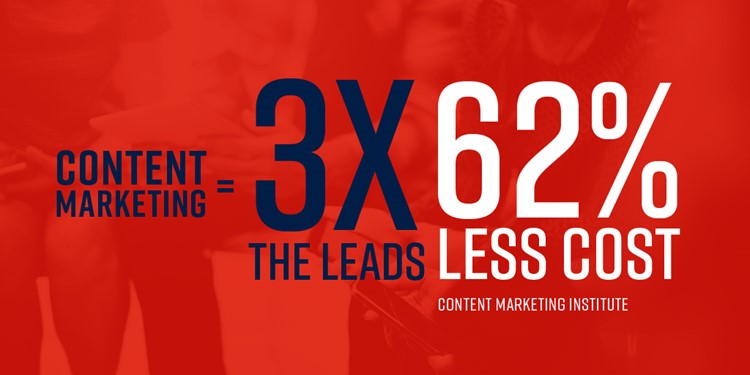Field of Dreams lied to you.
It lied when you were told you needed a website.
It lied when you had to set up social media profiles.
The 1989 film’s iconic line, “If you build it, he will come,” is a fabrication.
This might sound cold and Kevin Costner would likely not approve, but the truth of marketing your brand online is closer to, “If you build it, that’s great. Don’t expect anyone to care.”
Just posting a blog or sharing a post on social media is no longer enough to create engagement.
You still need the content. But now, you need a content development strategy.

What Happened?
Consumers view the internet today different than they did in the 90s and early 2000s. Back then, they might dedicate 10 minutes to a desktop search until they found the ideal website. Then they’d spend even more time exploring the website to learn about and research potential purchases.
But with smartphones in their pockets and purses, habits have changed. Consumers want information in the time it takes to get their coffee. To get that information, they’re asking their phones direct questions like:
- What’s the best pizza near me?
- How do I impress my friends from the city?
- Getting raspberry sorbet out of a berber carpet
- Is the new iPhone any good?
- Top food spots in West Virginia
Consumers want these answers fast—and tailored to them. They only spend an average of 37 seconds reading an online article! (Company.com) So if you’re not answering their question, the search engines have enough resources that they’ll find someone who will.
At the same time, consumers have grown to distrust your ads and are no longer drawn to your clickbait articles, emails, and popups. In North America, 80% of adults use at least one ad-blocking method, while 50% use more (hostingfacts.com).
To get noticed on the internet today, your content needs to be one of three things:
- Trusted and familiar to consumers where they are online (ex. social groups, influencer websites, and feeds)
- Highly recommended by the consumer’s peers (through reviews, shares, comments, etc.)
- Useful and engaging in a way that makes the consumer’s life better (ex. research, original expert tips, stats, and videos)
You get bonus points if the content is entertaining, supports a cause of the user (ex. child hunger, green initiatives), and/or creates an experience.
To do all this, you need to start the content development engine immediately.
The Content Development Engine
You need a combination of writers/publishers and subject matter experts (SMEs). SMEs have the valuable, in-depth knowledge consumers want. Writers/publishers have the means to extract that information, package it into content, and distribute that content efficiently. Together, these groups can create a near-endless stream of content.
At first, you’ll look at all this content being churned out and think, “What/who is this all for?” “Isn’t this devaluing my content by sending more of it to my audiences?”
And while you can target your content to key audiences, just realize that one of the beautiful things about the internet is that you never know who will find your content, share it, and ultimately find it valuable.
Starting the content development engine gives you: (1) valuable content that readers are more likely to share, and (2) consistent content generation so you create more value and credibility over time.
A content development engine prevents you from struggling to get content out, looking outdated, and retreading the same subjects over and over.
Just remember a few things as you begin your content development journey:
- Don’t throw anything away! Any content is better than none.
- Reorient your marketing around thought leadership regarding specific subjects.
- Analyze everything.
- Keep refining until you meet your goals.

Is Content Development Worth the Cost?
Not only is content development worth the cost, successful marketers spend large portions of their total marketing budgets on it: 40% for B2B and 26% for B2C (Content Marketing Institute).
But anyone can write…right? After all, 64% of B2B marketers outsource their writing (TopRankBlog). Maybe you know someone who just graduated college with an English degree. Or your trafficker enjoys writing. After all, with tools like Grammarly and spell check, you might think most of the work is done already.
However, content writers offer several advantages with their understanding of marketing communications, content strategies, and distribution channels:
- Results – Content marketing offers three times the leads of traditional marketing, while costing around 62% less (Content Marketing Institute).
- Higher quality – If you have a non-professional writer compose all your content, you could have plenty of content to distribute, but all you’ll really do is let audiences know how bad your writing is.
- Evergreen content – Your content will stay relevant, since content writers know how to avoid clichés and references that place a timer on how long you can use your content.
- Sales tool – Content writers know how to compose content that can be used just as well on your blog as it can be used by your sales team to educate prospects and share your thought leadership.
- Search engine optimization (SEO) – Your content will appear to the people looking for it, since content writers will know the right keywords use.
- Optimized for goals – Content writers are familiar with marketing metrics and tactics that can help them craft copy to achieve specific goals (increase conversions, attract specific audiences, etc.).
After all, Kevin Costner did invest enough money to build that entire baseball field, didn’t he?